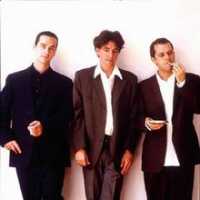There's a wise and sky-wide generous spirit to Wheat's new album Per Second, Per Second, Per Second...Every Second you can hear it loud and clear in the soaring, impassioned vocals on "Life Still Applies," the rollin' and tumblin' drums on "World United," the strutting, glammy guitar licks on "Closer to Mercury." In a world gone suddenly and deeply dark, Wheat has turned on a light.
Wheat started in 1997 in Taunton, Massachusetts. Singer-guitarist Scott Levesque and drummer Brendan Harney had met in art school and together with guitarist Ricky Brennan, started a very informal band, basically to exorcise some romantic and musical demons. Since then, Wheat has had a revolving cast of supporting players but the core remains Harney, Levesque, and Brennan.
Wheat began recording their music in Levesque's living/bedroom; later, with help from Dave Auchenbach (ex Small Factory) and Brian Deck (Red Red Meat), those songs made up Wheat's excellent 1998 debut album Medeiros, released on the Chicago indie label Sugar Free. The music had an air of serene resignation, its yawning spaces filled in by aquatic washes of keyboards, slowly warping guitar chords and gently urgent rhythms. Levesque sang melancholic reveries while the songs slowly unreeled long, lingering melodies redolent of hot and hazy summer. As Levesque puts it, "We were noisy in a quiet way."
Later that year the NME named Wheat's "Death Car" their Single of the Week. The limited-edition seven-inch sold out within days. (Funnily enough, one of the customers was Bush's Gavin Rossdale who later proclaimed it his favorite single of the year.)
Wheat recorded their next album Hope and Adams, also on Sugarfree, with visionary producer Dave Fridmann (Flaming Lips, Mercury Rev). "He was not shy about the experimental aspects," says Harney, "and that's a lot of the fun of recording ‹ to see the songs go where none of us thought they would go."
This time the music was a bit more lush, emotionally and sonically, yet still propelled by Brennan's incandescent guitar lines and Harney's subtly insistent grooves. Electronic sounds meandered in and out of the mix while the lyrics, as Uncut's Victoria Segal put it, "know that beauty and drama don't always lie in death-or-glory extremes, but in the quiet unfolding of everyday life." Hope and Adams made Albums of the Year lists in Select and Uncut magazines.
And now comes the next step in Wheat's evolution. If Medeiros was like a grainy black and white photograph and Hope and Adams was a subtle but momentous shift to muted hues, Wheat's glorious major label debut Per Second, Per Second, Per Second, Every Second is a giant leap into Technicolor.
While Wheat's follow-up to Hope and Adams was stuck in record company limbo the band made a key realization: "As people get older, they're less likely to run into fun," Levesque observes. "The other stuff is inevitable. Fun is better."
And the truth is, the Wheat guys are actually droll, outgoing people. "So if we're going to be honest in our music," says Harney, "there has to be a sense of humor there." And so, again with Dave Fridmann, they began recording more playful, contagiously upbeat sounds, while still harboring much of Wheat's usual introspection. The sunny, uncanny "I Met a Girl" was the first song the band wrote in this new mode. "It wasn't written for any other reason than wanting to have a song that turned us on," Harney says. "Let's forget about what we're supposed to be." It immediately became the standard by which all the other songs were judged.
And several songs look outward. "Hey So Long Ohio" touches on a perennial Wheat theme suburbia. "That's where people's lives are really involved in their families," says Levesque. "There's an interesting kind of love that goes on when you need each other instead of just wanting." "This Rough Magic" is about another kind of community. "We love the way rappers always talk about their crew," Levesque says, "and that song is our answer to that."
As for the album title, well, it has something to do with mechanical physics and Jonathan Livingston Seagull. It might also have to do with living in the moment. But you'll really have to ask Levesque he's the only one in the band who can really explain it.
Armed with the bright, shiny songs from Per Second, Per Second, Per Second...Every Second, Wheat shows are more joyous than ever, and yet just as riveting. Perhaps it's a bit of a change from Wheat's dawning days, but like all the best bands, Wheat is exploring new musical worlds while remaining uncompromisingly true to themselves. In Wheat's case, those worlds just happen to be a bit sunnier than before. "I'm glad I'm not as unhappy as I once thought I was," Levesque concludes. "Now I sometimes even enjoy myself!"
